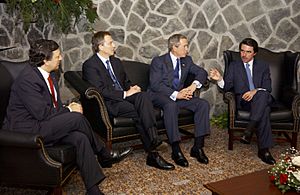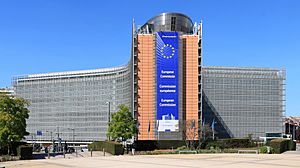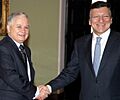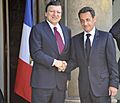José Manuel Barroso facts for kids
Quick facts for kids
José Manuel Barroso
|
|
|---|---|
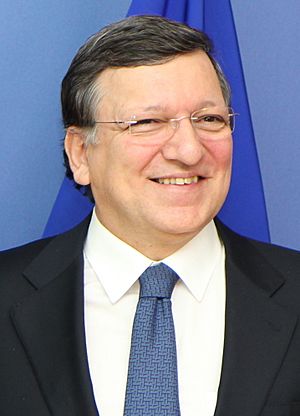
Barroso in 2013
|
|
| President of the European Commission | |
| In office 22 November 2004 – 31 October 2014 |
|
| First Vice-President | Margot Wallström Catherine Ashton |
| Preceded by | Romano Prodi |
| Succeeded by | Jean-Claude Juncker |
| Prime Minister of Portugal | |
| In office 6 April 2002 – 17 July 2004 |
|
| President | Jorge Sampaio |
| Preceded by | António Guterres |
| Succeeded by | Pedro Santana Lopes |
| President of the Social Democratic Party | |
| In office 2 May 1999 – 30 June 2004 |
|
| Secretary-General | José Luís Arnaut |
| Preceded by | Marcelo Rebelo de Sousa |
| Succeeded by | Pedro Santana Lopes |
| Leader of the Opposition | |
| In office 2 May 1999 – 6 April 2002 |
|
| Prime Minister | António Guterres |
| Preceded by | Marcelo Rebelo de Sousa |
| Succeeded by | Eduardo Ferro Rodrigues |
| Minister of Foreign Affairs | |
| In office 12 November 1992 – 28 October 1995 |
|
| Prime Minister | Aníbal Cavaco Silva |
| Preceded by | João de Deus Pinheiro |
| Succeeded by | Jaime Gama |
| Member of the Assembly of the Republic | |
| In office 27 October 1995 – 22 November 2004 |
|
| Constituency | Lisbon |
| In office 13 August 1987 – 26 October 1995 |
|
| Constituency | Viseu |
| In office 4 November 1985 – 12 August 1987 |
|
| Constituency | Lisbon |
| Personal details | |
| Born |
José Manuel Durão Barroso
23 March 1956 Lisbon, Portugal |
| Political party | Workers' Communist Party (1974–1977) Social Democratic Party (1980–present) |
| Spouses |
|
| Children | 3 |
| Education | University of Lisbon University of Geneva Georgetown University |
| Signature | |
José Manuel Durão Barroso (born 23 March 1956) is a Portuguese politician and law professor. He is known for serving as the prime minister of Portugal from 2002 to 2004. After that, he became the president of the European Commission from 2004 to 2014.
After leaving his role at the European Commission, Barroso took a job as a senior advisor for a large international bank. This move caused some discussion because it happened soon after he left his public office.
Contents
Early Life and Education
José Barroso was born in Lisbon, Portugal. His parents were Luís António Saraiva Barroso and Maria Elisabete de Freitas Durão.
He studied law at the University of Lisbon. Later, he continued his studies in Switzerland, earning a master's degree in political science from the University of Geneva. He also studied European Studies.
Barroso became interested in politics when he was a teenager. This was before Portugal became a democracy in 1974. During his university years, he was part of a student political group.
Political Career
Barroso started his academic career as a professor at the University of Lisbon. He also did research at Georgetown University in the United States. Later, he became a director at Lusíada University in Lisbon.
In 1980, Barroso joined the Social Democratic Party (PSD). This party is in the center-right of Portuguese politics.
Early Government Roles
In 1985, Barroso became an Under-Secretary in the Ministry of Home Affairs. This was under the government of Prime Minister Aníbal Cavaco Silva. In 1987, he became the Secretary of State for Foreign Affairs. He held this role for five years. During this time, he helped create the Bicesse Accords in 1990. These agreements brought a temporary end to the Angolan Civil War. He also supported East Timor's independence.
In 1992, Barroso was promoted to Minister of Foreign Affairs. He served in this position until 1995.
Prime Minister of Portugal (2002–2004)
In 1995, Barroso was elected to the Assembly of the Republic, which is Portugal's parliament. He became the head of the Foreign Affairs Committee. In 1999, he was elected president of the PSD party. This made him the Leader of the Opposition.
In 2002, the PSD party won the elections. They formed a government with another party, and Barroso became the Prime Minister of Portugal on 6 April 2002.
As Prime Minister, Barroso worked to reduce government spending. He aimed to lower Portugal's budget deficit to meet European Union rules.
In March 2003, Barroso hosted a meeting in the Azores islands. U.S. President George W. Bush, British Prime Minister Tony Blair, and Spanish Prime Minister José María Aznar attended. They discussed the 2003 invasion of Iraq. Portugal, under Barroso's leadership, supported the invasion and sent non-combat troops.
Barroso did not finish his term as Prime Minister. He was chosen to become the next president of the European Commission in July 2004.
President of the European Commission (2004–2014)
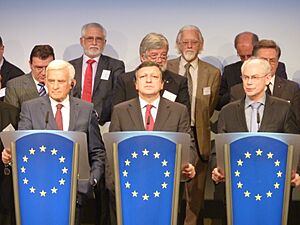
In 2004, Barroso was chosen by the European Council to lead the European Commission. The European Commission is like the executive branch of the European Union. It proposes laws and makes sure EU rules are followed.
During his first term, the Commission worked on important topics like Turkey's application to join the EU and changes to EU rules. They also focused on creating a single market for services and addressing climate change.
Barroso was re-elected for a second term in 2009. He was the second Commission president to serve two full terms. His second term ended on 31 October 2014.
In 2012, Barroso suggested that the EU should become a "federation of nation-states." He believed this would help the continent deal with economic challenges.
After Brussels (2015–Present)
After leaving the European Commission, Barroso became a professor at Princeton University and the Portuguese Catholic University. He teaches about international relations and European studies.
In July 2016, Barroso became a senior advisor for Goldman Sachs International, a large bank. This move was discussed because it happened soon after he left his important role in the EU. An independent panel looked into the matter and concluded there were no violations of rules.
In 2020, Barroso was chosen to be the chairman of the board at GAVI, an organization that helps provide vaccines around the world.
He also holds several other positions, including being a member of the Steering Committee for the Bilderberg Group and a member of the Board of Trustees for the UEFA Foundation for Children.
Personal Life
In 1980, José Manuel Barroso married Maria Margarida Pinto Ribeiro de Sousa Uva. They had three sons. Maria died in 2016. In 2023, he married Joana Gonçalves.
Besides Portuguese, Barroso is fluent in French, Spanish, and English. He also has some basic knowledge of German.
Honours and Awards
Barroso has received many awards and honours from Portugal and other countries. These include:
- Grand Collar of the Order of Prince Henry (Portugal)
- Grand Cross of the Order of Christ (Portugal)
- Grand Cross of the Order of the Southern Cross (Brazil)
- Great Collar of the Order of Timor-Leste (East Timor)
- Grand Cross of the Order of Merit of the Federal Republic of Germany (Germany)
- Grand Cross of the Order of Vytautas the Great (Lithuania)
- Grand Cross of the Order of Orange-Nassau (Netherlands)
- Grand Cross of the Order of Civil Merit (Spain)
He has also received many other awards and honorary degrees from universities around the world, recognizing his contributions to politics and international relations.
Images for kids
-
Barroso with Polish President Lech Kaczyński in Warsaw, November 2007
-
Barroso with French President Nicolas Sarkozy in Paris, July 2008
-
Barroso with Azerbaijani President Ilham Aliyev in Baku, January 2011
-
Barroso with President of the European Council Herman Van Rompuy and U.S. President Barack Obama in Washington, D.C., November 2011
-
Barroso with Armenian President Serzh Sargsyan in Yerevan, November 2012
-
Barroso with President of the European Council Herman Van Rompuy and Russian President Vladimir Putin in Yekaterinburg, June 2013
-
Barroso with Serbian Prime Minister Ivica Dačić in Brussels, June 2013
-
Barroso with Montenegrin President Filip Vujanović in Brussels, October 2013
-
Barroso with Polish Prime Minister Donald Tusk in Warsaw, May 2014
-
U.S. President George W. Bush, French President Nicolas Sarkozy and Barroso in 2008
-
British Prime Minister David Cameron and German Chancellor Angela Merkel watching the 2012 UEFA Champions League Final with Barroso, US President Barack Obama, French President François Hollande and others during the G8 summit.
See also
 In Spanish: José Manuel Durão Barroso para niños
In Spanish: José Manuel Durão Barroso para niños
- President of the European Commission
- Barroso Commission
- European Union law
 | Victor J. Glover |
 | Yvonne Cagle |
 | Jeanette Epps |
 | Bernard A. Harris Jr. |


